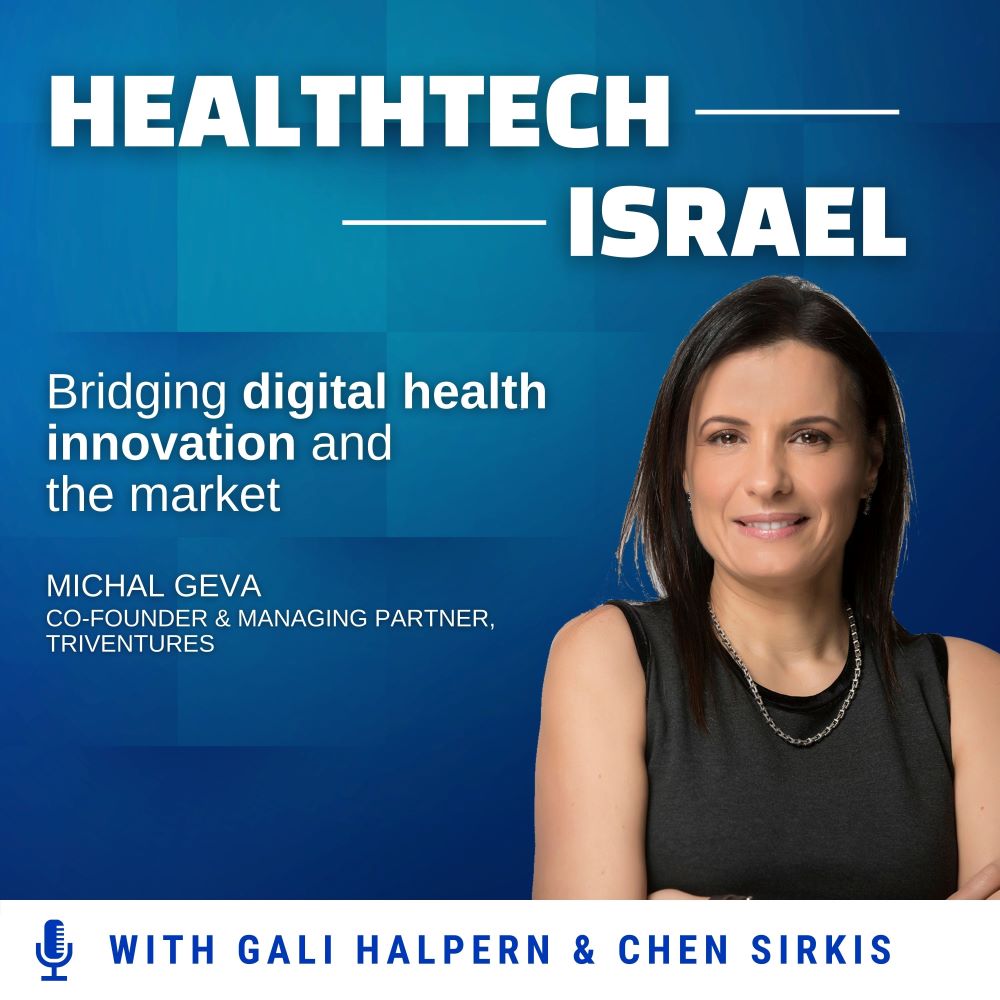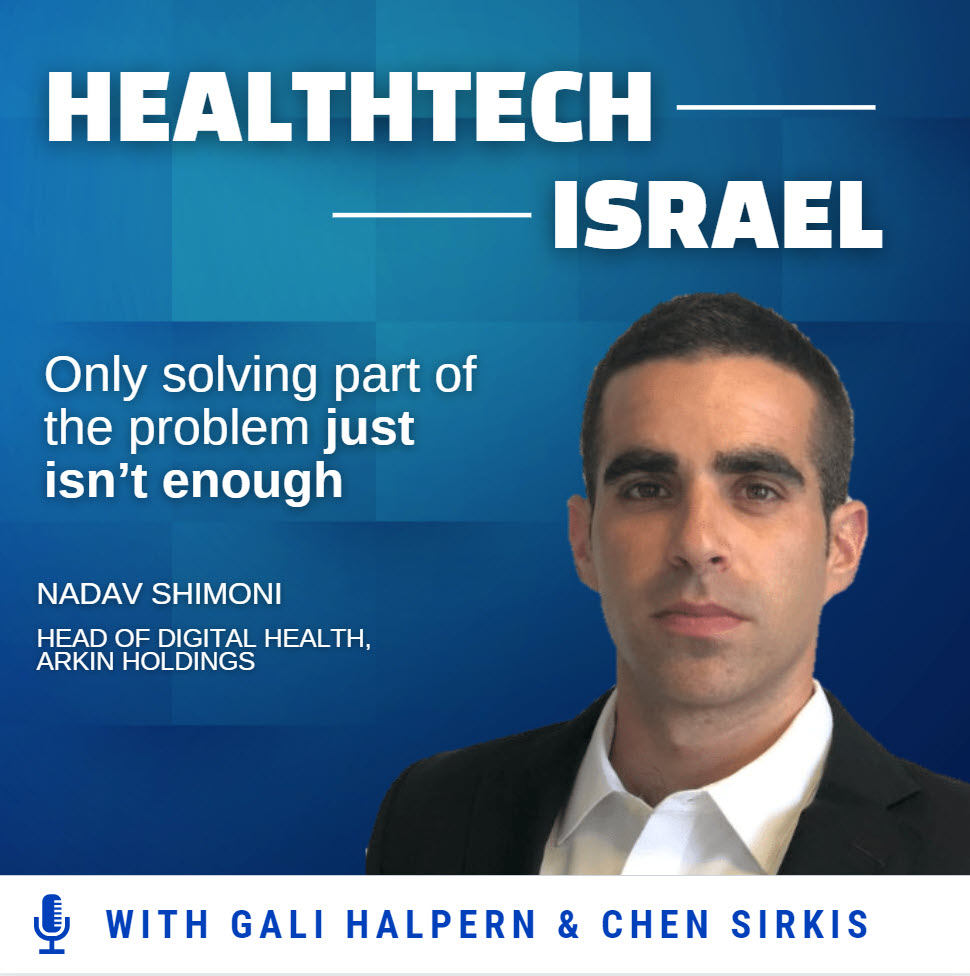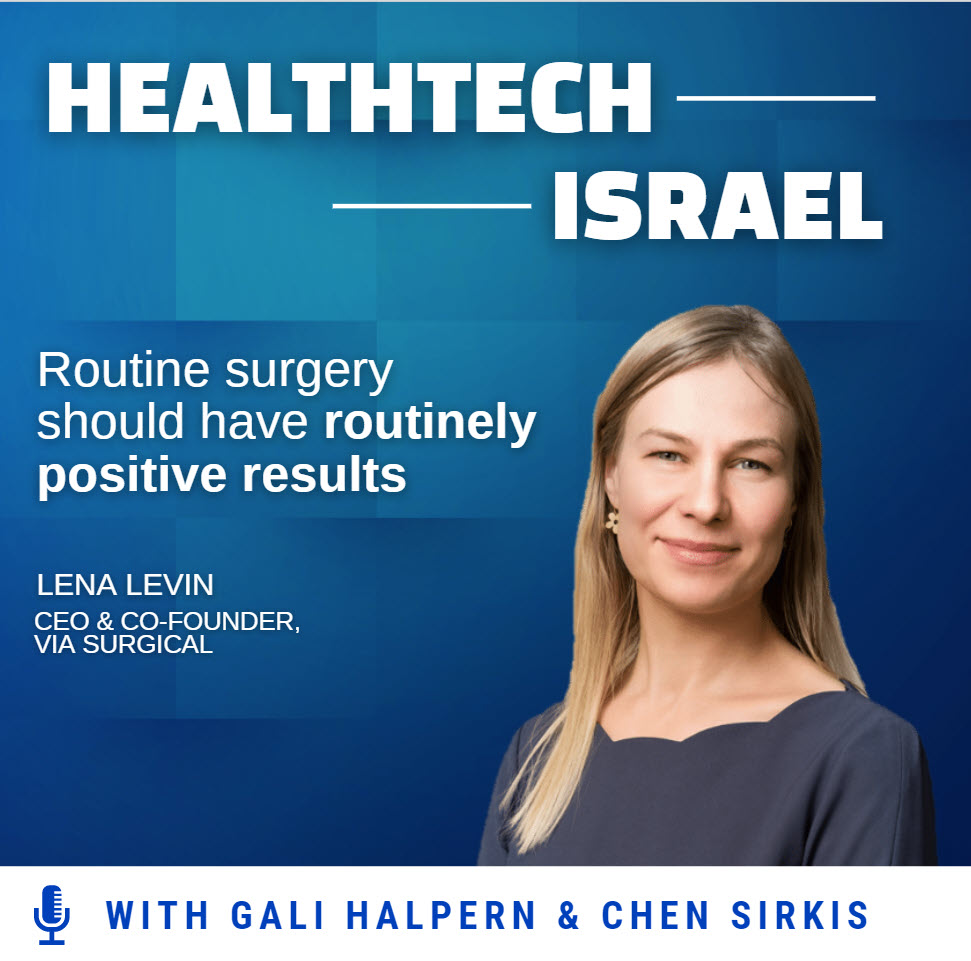Michal geva
co-founder and managing partner, triventures

Michal Geva is Co-founder and Managing Partner of Triventures. She is one of the most prominent investors in Israel’s MedTech and digital health scene. Michal resides on the boards of many companies and has accumulated a track record of multiple exits.
Show Notes
Michal Geva is the managing partner and co-founder of Triventures. Michal is one of the most prominent investors in Israel's MedTech and digital health scene. She resides on the boards of many companies and has accumulated a track record of multiple exits, including 6over6, Orthospace, and Aprica.
01:01 Where did your passion for health tech actually start?
03:42 Why did you decide to found Triventures?
09:34 Could you expand a little bit on how your model works?
11:52 Do you build a company to exit versus building a company to scale?
18:30 At what stages do you look for ventures intrapreneur ships in terms of their lifecycle?
29:01 What has changed for try ventures over the last two years in terms of the investment strategy?
38:30 What are some tips for working with investors and managing the Board of Directors?
42:06 How does an early-stage company or a company get on your radar? And what can they do at the meeting with you to come out better or not worst on the other side?
49:02 What are the unique challenges to females on the leadership side as running a VC on the one hand and as a CEO on the other?
Interview Transcription (mild edits)
So, let's start by you telling us a little bit about your journey before Triventures. And where did your passion for health tech actually start?
Michal Geva: Well, Chen, we have to go way back and I'll have to date myself. Because I got involved in the medical device space 25 years ago, after I did a couple of years in the other side of high-tech. And I was invited to be the first employee of a startup in the cardiovascular space. It was a completely different world for me, but I really felt that I got the chance of my life.
It was with Oren Globerman and Motti Beyar who used to be the godfathers of this industry way back. That was the time that we had only about 50-60 healthcare companies in Israel, can you imagine? Today, there's over 1000s of companies in this prominent space and I just jumped in.
As the first employee, I took a computer then a chair and a table. For first using my experience there, I basically touched everything. So, from remembering the first year, I was doing prototypes at midnight under the microscope and I learned how to do harvesting of veins in the Animal House and it was a lifetime experience. But as you understand, I'm a startup person.
And only after probably 10-15 years doing startups. I shifted gears and wanted to see not only what Michal wants to do when she grows up, but what the industry here needs.
And that's how I started Triventures.
I've been doing startups for most of my career or about half now actually. I have been in the startups; in Israeli startups. And later on, I was headhunted to come and help run a company in the Bay Area that will later transitioned to Boston Scientific. Over my career in the startup world, I managed five different departments, regulatory QA, clinical affairs, and then ran all three of those together. Then moved into the business side of things marketing and business development.
And you are the first woman to found and manage a venture capital fund in Israel. Why did you decide to found Triventures?
Michal Geva: Well, it's true that I was the first woman that started a fund, but I knew about it only retroactively. As an entrepreneur, you have a mission and my mission was to bring the international flavor into Israel. I have to admit, Gali, that at the beginning, I didn't even plan to start a fund. I really wanted to bring not only money, but more importantly, the value adds to early stage startups in the field that I felt I knew well.
That's why I reached out to two of my cofounders, Professor Peter Fitzgerald and Professor Martin Leon who I worked with when I was in the Bay Area. They were the home docs and we worked very well together. And I said, 'Guys, we have an amazing opportunity here. Israel is full of innovation in healthcare.'
We know this space we understand not only the technology but , we have to also understand integration into the market. So, why don't we put our heads together and actually start working with startups to, in a way, bring the international flavor to Israel. That was really the mission of when we started.
And we all started companies in the past, we all worked in big startups. Peter and Martin, as entrepreneurs started, probably altogether over 20 companies. They've been involved in major clinical studies; they've been working with the FDA as consultants. We've been working all together within the industry with the big players. And I always thought that Israel has so much to offer in terms of innovation.
But as we know, in healthcare, it takes a very long time and requires a lot of money to really bring your product into the market. So, I thought to myself, we have to think about integration into the market really early in the process. If we go and spend too much time and energy and coming up with a product that might be incredible, but will not solve a big enough problem.
Or that reimbursement will not be able to cover, or there's not a straightforward way to go to market, then, we might stray more often. So, the idea was to bring kind of the experience from people like Peter and Martin at the beginning, my experience from startups, to early stage technologies; work closely with them.
Very early in the process, I also thought that if we could bring groups that understand what it means to take the technology and scale it up in the market, it will be extremely helpful. And that's how we started working in a unique way with strategics. Our first fund, that was back in 2010, we had about five strategic partners that invested; Johnson & Johnson, Medtronic, Abbott, and Volcano at the time, that basically wanted more exposure to Israel.
And we started forming a relationship that said, 'So, we see hundreds and hundreds of companies in Israel. Why don't you sit on our shoulders and be able to have an open channel of communication? You will be able to see another angle of the Israeli ecosystem. We'll be able to share with you new ideas that were funding or consult with you even. And eventually, bridge a little bit of this gap between the early innovation here and where the market is.
And that generated a unique partnership with those strategics; that grew over the years. I'm very, very proud to say that today we have about 12-13 different groups, strategic large corporates that invested directly in Triventures and they don't have any strings attached, right. They are financial investors but enables us to have an open channel of communication that eventually is not just helping them and us. But actually, I think helps a lot.
The portfolio companies and the Israeli industry as a whole because we make a lot of those introductions over the years. We introduced many of our strategics to companies we never invested in. And today, our strategic bandwidth doesn't include only medical device companies, where Triventures started. But over the years, we've really shifted gears and today we are much more focused; we're almost only focused on digital health.
And we have organizations like Samsung and Nikon is sample which is the largest insurance company in Japan. We have organizations like Intermountain Healthcare that invested in us and one of the largest and the best accountable care organizations in the United States.
So, we really try to surround ourselves with very smart groups. Learn from them, bring those experiences and understanding of the market to the Israeli entrepreneurs sooner rather than later.
Is this the reason that you have offices in two countries, in Israel and the US, exactly to bridge that gap? Could you expand a little bit of how your model works?
Absolutely and yes. We have offices here in Herzliya. We have offices in Sheba Medical Center and we'll talk a little bit about that partnership which is also pretty unique, I believe. And we do have an office in the Bay Area where my partner Peter Fitzgerald, leads the effort. And yes, we are investing in Israeli and American companies, and also European every once in a while.
But we have to remember that most of the technologies in medical devices as well as in the digital health, are looking at the US market. The US market's healthcare system is pretty unique. But it's the largest market in the world for those technologies today and most of those innovators are looking at the US as a market leader. And therefore, needs to fine tune their offering, their product, market fit to the US system.
And that's why we have offices in the Bay Area, we are seeing companies there. But not only that, we're helping our companies when they move to the United States; with introductions, with connections, with all their Rolodex of relationships, that we have as a fund and as managers and partners at the fund.
I always say that all my relationships and all my partners' relationships are here for one reason, and this is to help our loyal companies grow and build them more successful companies, as well as to the industry itself. The world is round. We're working a lot with companies that have not become our portfolio yet or will never become.
But I really think that giving is receiving. That's one of the mantras of my life. So, I like doing it also in business.
Do you build a company to exit versus building a company to scale? It's something that that's always is important here in Israel. Because in the high-tech ecosystem, there are so many very large exits. I think that entrepreneurs in the health space, have always looked at that and said, 'Oh, we should just build the company and sell it.' But there has been a big change in the last 10 to 15 years around that concept in our health tech space. Could you share your view on the health tech ecosystem? Should a company be built to exit or should it be built to scale?
Michal Geva: Sure. Well, it's a good question. My take is that companies are being bought, rather than companies being sold. Okay. Every company has to build itself, with the fundamental of technology going to market, with a clear path of how it could be an independent company. Otherwise, just building features rather than whole solutions might make it extremely risky and reduce the likelihood of success.
So, if you're asking me, I think we should always build strong companies that are here to stay. If somebody comes in, buy it on the way, and if it's for the right amount of money and good timing, so be it and we're going to all be happy. But building just tiny little features that somebody is going to add to this portfolio, I think is a risky business.
Having said that, I do think that there is a very big difference between solutions happening in the medical space, medical device space, versus let's say the digital health. Even in medical device, I think you have to build the business. You can't just finish your development and believe that somebody is going to buy it. Because guess what? It's not always going to happen.
Then if it that's going to be the case, you're going to sit there for the FDA approval. And , wait for the phone to ring with the approval and believe that then you're going to sell your company. I think you might be sitting next to the firm for a long time. So, you have to make sure that you have a pathway not just to overcome the technology part or the regulatory part. But actually, make sure that you can make true solid business with your technology.
And this is where you have to make sure you have a go to market either you have to have, who's going to sell it, how much, , people are going to be willing to pay for that and the medical device. But in medical devices, today more than in other industries integrating into the hospital setting is a challenge like everything.
But since a lot of the strategics are coming with a bigger offer than a specific device to the hospital setting, for example, Medtronic, or Boston Scientific. They are coming and saying to a hospital, 'I'll give you all your cardiovascular devices,' or 'I'll give you all your cardiovascular and five different other departments, surgical activities, as well.'
Then I think for a company with a single product it might be more challenging to come with a one trick pony. So yes, you have to build a business, yes, you have to show that you can sell it that there is a true business model. But many times, we see digital medical device companies get bought after they show a product validation in the market, rather than bringing it to the $100 or $200 million worth of sales.
In digital health, it's very different. First of all, it's a completely different sector and if you want, we can touch upon that. But even if the time for features is over, you have to come up with full solutions. And you have to make sure that you can scale and you have to make sure that you can build very strong technologies and services around them and go for the moon.
Shoot for the stars, build scalable businesses. And then if somebody buys you, then it's great. But in digital health today, we have a great liquidity path that we haven't had two years ago. Digital health in 2020, has turned the page and moved from a market of vision to a market of an execution. Only in the past 18 months, we've seen 22 unicorn, native digital health companies. So, digital health companies that became public either through an IPO or a SPAC.
And those unicorns have to go shopping by themselves; we see a lot of movements. So not only M&As, the tech, the retail, the pharma that are buying. But actually, independent companies in digital health that are now in the market and are trading for billions and billions of dollars. So, we do see more holistic services, scalable businesses in the digital health that's the path.
Triventures has been transitioning from traditional MedTech to digital health. What stages do you look for ventures in in terms of their lifecycle? And additionally, there seems to be a funding gap when it comes to digital health startups. While there are investments in later stage companies at those in incubation or early stage, there seem to be missing this sweet spot in between. What does the industry need to do in order to solve this problem?
Michal Geva: That's a very good question, Chen. Let's start maybe from the second one, okay. Because you're right, there is a lot of money going into late stage companies, right. We saw just last couple of years where there is a tsunami of investments in this space in Q1 of 2021. There was almost, just in this quarter, over $7 billion went into funding of startups in the digital health space.
But if you double click on this number, which is almost more than what was invested in the entire previous year, you'll see that most of this capital, almost all of it went into the late stage. And we see it not only digital health, we see it also across the board, we see it also in tech. Where investors, there's tons of money in the market.
But people are willing to pay more for reduced risk. So, a lot of the capital is going into the later stage companies that have 10 or $15 million in revenues are being already SPAC in public. We're seeing the big numbers there, which obviously generates, a gap in the earlier stage. We see it is less in the technology space because people are willing to take the risk earlier.
Because they could see how in a year or two, a company could get from ideation to integration into the market with a selling product in the millions. Where in digital health and in definitely medical devices, it's completely different story. In medical devices, let's put that aside for a second. Because that I think, requires a lot of different type of investors that really understands this matter.
Unfortunately, ever since I started this business, the last decade, probably, 90% of the investors within medical devices left the business because of those relatively low IRR. And the digital health is somewhere in between people definitely see the revolution; the data revolution in health. But they're saying I want to be where the risk is already removed and I don't want to wait for this 3,5,6 years that sometimes it takes.
So yes, there is a gap. And in the earlier stages, there is much less capital. We at Triventures invest both in the early stage, as well as, trying today to go to more of an area where there is a little bit more product market fit. To see that if there is already it technology and understanding, at least, of the go to market strategy.
But we are ... If you ask, where do we invest? We invest in relatively early, mostly during seeding stage. This is where we are both in Israeli companies as well as US and European.
I think this is the right time to talk a little bit about your joint fund with Sheba Medical Center. And what the rationale is behind that partnership?
Michal Geva: So, as you understood, we doubled down in the digital health space. Actually, I don't know if you know, but we were the first investors in Israel to actually start investing in digital health. Kind of funny, but in 2011 when you guys were children, we decided to do a course in Hilton Hotel here in Tel Aviv.
And just talk about the trends that are we're seeing Peter, Martin and myself are seeing. And one of the three trends that we were discussing on stage in front of 500 people, we called it "When IT meets MT (MedTech)". And it was funny because at the time, I did think it was funny. People completely thought that we're crazy; They didn't understand what we're thinking, or what we're smoking that morning. Nobody commented.
It was so out there that it was kind of hilarious. It took us all (by surprise) but we really felt it in the air. We felt how the medical community has to enjoy the tech revolution. And we saw how those two things (medical technology and IT) could work together. So, it took us a while because there were not even entrepreneurs to invest in. Actually, I understand that you're interviewing Omri Shor from Medisafe.
Omri and Rotem, his brother, were the first entrepreneurs in the digital space that we invested in. But it took about two years after that course. At the beginning of the time, nobody really understood that there's opportunities and we have to pull in entrepreneurs and educate them a little bit about the needs and the opportunities.
But we are great believers in that. And I'm glad that COVID year has shown the world that; remote care, personalized care, using data is a tool for innovation in healthcare is definitely here to stay. And in keeping that in mind a few years ago, we decided to partner actually with Sheba. As , Sheba is the largest hospital in Israel and they have an amazing Innovation Center.
And most importantly, they have amazing leadership that see how innovation could take their capabilities, their data and excel. Not only the care inside Sheba, but help Israel become the head of the digital health revolution. Sheba is sitting on huge amounts of data because Israel was the first country in the world to transition our health records from analog to digital.
We started doing that; we as a nation started doing that about 25-30 years ago. We're just a reference, most of the Western world started doing that in the past 5 to 10 years. So, now think about Sheba. Okay, which is one of not only the largest hospital in Israel, but one of the largest hospitals in the Western world. That are sitting on a pile of data from all your electronic medical records, imaging, lab tests, pathology, genomics, all in a digitalized way.
And they're using it for their own internal innovation. But we kind of said, put our heads together and said, what if we can open it not only for the innovators from within Sheba which is incredible, but to startups. And what if we can create a place where startups will enjoy not only capital, not only the strategics and experience that the people from Triventures bring. But actually, worked close enough and generate a true partnership where they could also get access to Sheba's data. Of course, anonymized and de- identify but still, for health population in many, many other applications. This data is a goldmine. They can use Sheba's relationship with other hospitals as a network effect.
And they can use Sheba as a pilot environment and as a design partner, to really excel innovations with it. If we will put all this in one place, it will be extremely beneficial for the innovators to come and enjoy all those components in one thing. And that's how this partnership has evolved. And we generated, we started a fund together, Triventures ARC, that invests in digital health at early stages.
We're extremely proud of this. It just shows that innovation is not only technology, but this is definitely a financial innovation. Think about it. How many governmental owned hospitals do we know in Israel and in the world that have generated a true partnership; a general partnership (GP), right. A fund with an external business-oriented organization. So, this is really thanks to the trust and the leadership of Sheba. And I think it's extremely innovative and helpful.
It's really heartwarming to see that, as you pointed out, innovation is not happening only in academia, it's happening in hospitals too. It's happening everywhere and it's great that you're leveraging it. It's funny that you mentioned last year, what has changed for Triventures over the last two years in terms of the investment strategy especially when you couldn’t travel because of Covid?
Michal Geva: On a personal level, I completely loved it. I used to be at least a week, a month, somewhere in the world. It is extremely helpful for the business. Constantly meeting a lot of new people, everything is so exciting and we are all the time in different places. But we learned to work different, we learned to go deeper.
At the beginning, we felt uncomfortable with investing in people that we do not see. We were sitting in the beginning and we thought all the time that it's going to change. So we said, 'We'll go back to our life quickly'. So we kind of said, 'Okay, let's see, what are the companies that we've seen, and we know the teams and we know the companies and maybe things have changed'.
And maybe there's new opportunities, because of this situation in terms of integration into the market more than anything else. And the first couple of investments during the COVID year, we really focused on companies that we knew already. But then, we jumped into the water. And the last few investments that we've done, 4 out of the 6 that we've done this year, were actually companies that we have not met before, in that we completed a full diligence circus process without meeting the people.
And we did what we thought, at the beginning, was impossible but I think it's worked very well for us. Actually, my partner, Netalie Nadivi, is now in the United States; She went to see three of our new companies. And we were discussing just yesterday, what were the gaps, right? You spend so much time on diligence. You spend so much time on working with those entrepreneurs later after the investment on a regular basis, not just on boards. But we're pretty active investors that work with the entrepreneurs on a regular basis.
And we learned that, if you're doing your homework well enough and diligently enough and develop partnerships that are solid, you can learn a lot from interactions on the Zoom. So, we were pleasantly surprised. So yes, I enjoy dramatically not getting on planes and I don't miss a bit of that part of life. Don't tell anybody.
Does it harm the business? Yes, it does harm the business and therefore we will need to probably hybrid. Find the right balance between those personal interactions and the ones that you can do on Zoom. But I do think it will affect everybody. And I think we'll all think twice to have to go to California or to China for a meeting with an investor or a board meeting.
So, that's on a personal level. On a macro level of digital health. Yes, I just mentioned it, but I do think that the world has changed and turned a page. 2020 was a tipping point year for that and the whole revolution of the data revolution in healthcare, I think is here to stay. It's not an anecdote that we're going to see. Expand not only telemedicine that we can all witness today but in personalized medicine, in prevention, in increasing workflow efficiency.
What we see today in telemedicine is probably only the lobby of a skyscraper building, that will be how we're going to consume healthcare. I think you guys, me, my children, our parents. The way we're going to consume healthcare in the next decade is going to change dramatically. Just a year ago, we didn't think that we could feel comfortable seeing our doctor on Zoom.
I remember a year and a half ago talking with groups about telemedicine and that was a challenge. How are you going to convince your doctor or my mother to see her doctor on Zoom? Today it's history. Both the patient, the doctor and the healthcare systems understand that this is more efficient, easier and very, very convenient.
The satisfaction rate of telemedicine today is about 90%. There're business models, there're reimbursement codes that enables that. But as I said, it's only first class. Think today about, I don't know, having this conversation, for example, recorded and transcribed. And all the information will enter into my electronic medical record (EMR). The computer will do all the analysis of comparing all the new information with what is in my history book.
Compare it to all the different protocols and clinical studies that are available in the net, and come up with a suggestion to the doctor, 'How to treat me this.' This is not science fiction. This is one of the reasons that just last week, Microsoft bought Nuance for $20 billion, right. Why? Because they have monitored for the past several years, 450 million interactions between doctors and patients in algorithms, today, understand complex association in the medical space.
So, when I'm seeing my doctor on Teams, for example, or tomorrow on Zoom, you'll be able to get all this added value. What about hospitalization at home? Not only seeing your doctor on Zoom, but instead of being hospitalized in Sheba, or in Mayo Clinic, what if we could take that to a hospitalization at home.
A nurse or a technician will come to my home with all the sensors like EarlySense, which is an Israeli company, that will analyze embedded in my bed; all my movement, my heart rate, my breathing, my SpO2, etc., etc. Beam all this information back to the nursing station in the hospital. And every time I'm getting out of my personalized kind of norm, somebody gets an alert and see if I need to change my medicine or I need some kind of an intervention.
How many people are getting staph infections, infections that we're getting in hospital setting today in Israel; Israel is a small country. 5000 people die from staph infections for no good reasons. Hospitalization at home could solve that. And it goes on for optometric or orthodontist, for mental health. And we have many of those in our portfolio companies that are revolutionizing care instead of coming to the doctor or the clinic or the orthodontist or the optometrist. Just do it at the comfort of your computer in your hand, which is your phone.
Because you work on a daily basis with CEOs of digital health and MedTech companies, how is it best to interact with investors, and to manage your board? What tips do you have to CEOs on how to interact with you and the fund so companies get the best value out of it?
Michal Geva: Investors are not just here for the money. No, I will rephrase it. An investor needs to make money for their investors. So, they are here for the money. But what I was trying to say is that they are your partners. Now if you choose carefully, you can really find many investors that know your business, and are familiar with the ups and downs of startups.
There's a lot of people with experience of how to build companies. There's a lot of people that are experienced in the domain expertise. you have to find them; you have to choose carefully; there has to be a chemistry. But all in all, investors, I think should be seen as your partners, not as your bosses, and not as, on the other hand as a cash machine. So if you managed to include them in your thought process, in your dilemmas, in your decision-making, I think you'll be able to enjoy their network, their experience. They're not smarter than you. But as a CEO of a company, you're focused on your deliveries. Your deliveries tomorrow, your deliveries to the end of the quarter to the end of the year. Where investors many times, they've seen a lot of things. We at Triventures, for example, we see about 700 different companies a year. It gives perspective. You see how other companies are dealing with a specific situation. You see what works and what doesn't work. You have been on that, I don't know, I've been on probably 20-25 boards over the past decade. You've seen dynamics. And this is the perspective that a good investor probably could help an entrepreneur.
And I believe that if there is a good chemistry, which is critical, because this is a partnership. This is like marriage. Then, being able to tap in on this experience of this perspective, and on the Rolodex on the network of your investors could be extremely, extremely helpful.
So, you see around 700 ventures more or less a year. You end up investing in about 6. How does an early-stage company or a company get on your radar? How does it elevate above the noise in the marketplace? When I say noise, I mean 200-3000 other startup companies that are battling for the budget. And what can they do at the meeting in order to come out better or not worst on the other side?
Michal Geva: Okay, that's a big question. I'll have to think about it. But what we're looking is first of all, leaders. So, management team is the most important part, when we're looking at a company. Technology is one thing. And therefore, when you're creating a management team, a founding team. I would first of all, encourage you to make sure that you're not only focusing on the technology part.
3 geniuses from 8100 that are really, really good in a specific area of technology is great. But don't go and focus only on that part. Because today, the hardest thing in digital health company is not the technology, it's actually the integration into the market. Since we're really good in technology, many times, we are focusing all the pitch on the technology part. And for me, it's not enough; even for an early company. Even for a seed company, I would like to see how the entrepreneurs, how the team is thinking, beyond the technology components. At many times, I would say guys to amazing. Let's assume it's working. What do we do with it next? Because I'm sure that you're brilliant, and I'm sure that you're going to do the impossible in the component of technology you're going to fix.
But, how are you going to overcome about the go to market strategy? How do you identify and what was your thinking process about who's going to pay for it? What kind of value does it create? How much are people willing to pay for that, etc., etc., etc. And we would really like to see those kinds of answers, I would say, it doesn't have to be complete.
And we're not only looking at companies with revenues where you'd like to see the bottom line of an Excel. But even if you're an early stage company, I think you should spend the time, the energy and the talent pool, in order to make sure that you give those elements enough consideration. Another thing that is maybe a little tip for entrepreneurs, especially they are first timers.
We have to feel comfortable that we can trust you. Sometimes people are saying with a million-dollar investment, I could solve this, this, this, this, this, and also that. Setting up expectations that are not necessarily realistic, doesn't give you more credit. Especially, for people that understand what it takes to take the company from the stage you're in, to where it should be. So, try to make sure that you're not just thinking that for me, it will happen quickly. And everything will fall in the right praise. And that's why I don't need a lot of money. And I can do it in a very, very short period of time. Let's make sure that you guys are realistic. Let's make sure that you have a good grasp of what does it take. Because this is also something that builds trust. We eventually need to know that we're investing in you and what to do with that.
So, there has to be that kind of component as well. Maybe one more tip to think about is... I always say that God made us with two ears and one mouth. And that's a good ratio, right. Many people are getting so excited about what they want to share and sell and then present, that they don't listen very often to feedback from the market. Now, I'm not saying that I'm smarter, or anybody from my team is smarter than the entrepreneur that has been thinking about it. But listening is a component, it's a very important component for startups. On one hand, you have to believe in yourself. On the other hand, you need to make sure that you're listening to the feedback from the market. And if you're not listening in a meeting, for example, with investors. I would probably tail a little bit give a hint about, how you're going to work with your customer? Or how are you going to work with your employee or how you're going to work with your advisor? If everything that's one thing. If you really could grasp the input from whoever is with you, and give some space for that as well, I think it's also an important component. The difference between a good CEO and an excellent CEO, in my opinion is how many times he needs to hear the feedback and feel he understands there needs to be changed.
Some CEOs would hear feedback about their product 2 or 3 times and say, 'Well it's consistent, let's make a change'. And others would need to hear it time after time after time, and they will still be convinced that the product is perfect. The market has a problem. So, this is also something that we are looking at.
How is it being a female leader in the health tech space? What are the unique challenges to females on the leadership side as running a VC on the one hand and as a CEO on the other. Where should you go if you want to be the next Michal in, let's say, 25 years?
Michal Geva: I'm not suggesting anybody to be the next Michal in 25 years and not tomorrow. I could share a little bit what it means to be running a fund, if you're interested. But let's go first to your first question. Female entrepreneurs, female investors, I have to say that I really never look at myself as a gender kind of leader. I mentioned earlier that, yes, I was the first female founding partner.
But I learned about it only when it was written in the newspaper after I closed the first fund. It was kind of funny, I didn't even pay attention to that. I knew I had a mission and I knew I wanted to do something. And then, I raised the fund together with Peter. And then they did an article in the paper. And even there, they never talked about it. Somebody said, 'Hey, she's the first entrepreneur, the first female entrepreneur partner, or managing partner.' And it caught me by surprise, I have to say. I really never thought about it. And maybe that's how I see it. I never thought about if it's okay, or it's not okay. I haven't mentioned it, I have something, I believe in it and I do it.
The investment sector is a little bit of a boy’s club. And again, it's not a criticism. I think, it's the nature of people working with people that they know and they feel comfortable. And there's an ongoing kind of relationship in that ecosystem. And I think we, as women, have to just make sure that we enter it with enough confidence. And once you're in, you're in and we all see each other as professionals.
So, we just need to make sure that we're not shy at throwing ourselves into a circle that is a little bit different, I would say, or more male centric. But once you're in, I've never ever encountered in all my 25 years of experience in this space, any issue about being a woman entrepreneur. I kind of have this mantra to myself. Actually, I have it here even as a little postcard on my desk, which is my mantra. What would you attempt to do if you knew you couldn't fail? So, if you kind of think that you have a passion to something, and you manage to take a big load of a teaspoon of self-confidence in the morning and just go for it. If you're good, and you are strong enough and passionate enough, the business will come. It's a matter of taking responsibility.
It's a matter of being an entrepreneur and an initiative. And I think today more than ever before, gender shouldn't be that much of an issue. More than that, I think that in the past 5 years, I've seen a major change in the way that women work together to generate our own kind of girls’ club. Where we are helping each other at mentoring, brainstorming together. And it's incredibly helpful to have other people like you that you can sit and just say those are my issues. Those are my problems. Do you face the same?'
It generates perspective and generates vulnerability that gives a chance to come out somewhere. And I'm a great fan of that. So, self-confidence and a support system are a good start.
And we're already there.












